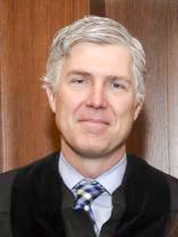
 Today’s blockbuster opinion in Bostock v. Clayton County, Georgia, holding that employers can’t fire LGBTQ workers under Title VII of the Civil Rights Act, may seem far afield from the regulation of greenhouse gases under the Clean Air Act. But its reasoning could have huge implications for climate change action. In saying that discrimination on the basis of sex under Title VIII should be read to include discrimination on the basis of sexual orientation, Justice Gorsuch for the majority said, basically, you have to read the actual language of the statute to figure out whether Title VII protects employees. And here’s the money quote conclusion:
Today’s blockbuster opinion in Bostock v. Clayton County, Georgia, holding that employers can’t fire LGBTQ workers under Title VII of the Civil Rights Act, may seem far afield from the regulation of greenhouse gases under the Clean Air Act. But its reasoning could have huge implications for climate change action. In saying that discrimination on the basis of sex under Title VIII should be read to include discrimination on the basis of sexual orientation, Justice Gorsuch for the majority said, basically, you have to read the actual language of the statute to figure out whether Title VII protects employees. And here’s the money quote conclusion:
Those who adopted the Civil Rights Act might not have anticipated their work would lead to this particular result. Likely, they weren’t thinking about many of the Act’s that have become apparent over the years, including its prohibition against discrimination on the basis of motherhood or its ban on the sexual harassment of male employees. But the limits of the drafters’ imagination supply no reason to ignore the law’s demands. When the express terms of a statute give us one answer and extratextual considerations suggest another, it’s no contest. Only the written word is the law, and all persons are entitled to its benefit.
We have to go back to Massachusetts v. EPA to understand why this language matters for the regulation of greenhouse gases under the Clean Air Act. The Court in the landmark climate change case held that air pollutants — very expansively defined in the CAA — include greenhouse gases. In doing so, it followed the statutory text of the Clean Air Act (over a vociferous dissent from the late Justice Scalia, who claimed to read the text differently). The Environmental Protection Agency then had to determine whether those greenhouse gases endanger public health and welfare under statutory language contained in Section 209 of the Act. Once EPA determined that greenhouse gases endangered public health and welfare, it then issued standards to regulate carbon pollution from the tailpipes of cars, from the electric power sector (the so-called Clean Power Plan), and from new sources of greenhouse gases like factories and power plants. The tailpipe standards and the Clean Power Plan have now been rescinded and replaced by the Trump Administration with much weaker versions. The Trump Administration rollbacks have been challenged in court on numerous grounds.
In all of the litigation over regulations to reduce greenhouse gases under the Clean Air Act, there are huge battles over what role the actual text of the Act plays in determining whether and how the EPA has to regulate carbon emissions. Since, as Mass v. EPA holds, air pollutants include greenhouse gases under the Act, then multiple sections of the very complex statute seem to either require or authorize EPA to regulate virtually every greenhouse gas source imaginable. Section 111d covers existing power plants; Section 209 covers moving sources like cars; Section 108 seemingly allows or even requires establishing what is called a National Ambient Air Quality Standard for greenhouse gases, which would require EPA to set a background pollution standard and then mandate that states issue plans (called State Implementation Plans) to reduce carbon pollution within their states; Section 160 covers new stationary sources of carbon pollution; Section 115 covers pollution that causes harm in other countries. All of these sections speak of “air pollutants” and seem plainly to cover greenhouse gases.
Despite the fact that the text of the Clean Air Act seems to require or authorize broad regulation of carbon pollution, however, several conservative members of the Supreme Court think the text is overridden by another concern: Congress hasn’t specifically spoken to the question of climate change and therefore EPA lacks the power to issue sweeping regulations to limit carbon pollution. Justice Kavanaugh is probably the leading proponent of this view. And it’s precisely the view he adopted in his dissenting opinion in today’s Title VII case. Here’s the key part of his dissent in Burdock:
For several decades, Congress has considered numerous bills to prohibit employment discrimination based on sexual orientation. But as noted above, although Congress has come close, it has not yet shouldered a bill over the legislative finish line. In the face of the unsuccessful legislative efforts (so far) to prohibit sexual orientation discrimination, judges may not rewrite the law simply because of their own policy views. Judges may not update the law merely because they think that Congress does not have the votes or the fortitude. Judges may not predictively amend the law just because they believe that Congress is likely to do it soon anyway.
Because Congress hasn’t passed a bill explicitly banning discrimination on the basis of sexual orientation, concluded Kavanaugh, the seemingly plain text of Title VII shouldn’t be read to do so (though, to be fair, he makes arguments about why he believes the text isn’t so plain).
As I explain in more detail in a post here, when Justice Kavanaugh was on the D.C. Circuit Court of Appeal, he dissented in a case involving the regulation of new sources of greenhouse gases under the Clean Air Act and would have struck the regulation down. Here’s a quote from that case explaining his reasoning that sounds remarkably similar to his dissent in today’s Title VII case:
EPA’s well-intentioned policy objectives with respect to climate change do not on their own authorize the agency to regulate. The agency must have statutory authority for the regulations it wants to issue. … Congress’s failure to enact general climate change legislation does not license an agency to take matters into its own hands, even to solve a pressing policy issue such as climate change.
Kavanaugh would have struck down the regulations even though the Clean Air Act’s text seemed explicitly to require EPA to regulate. Though he didn’t prevail, his dissent was used by the U.S. Supreme Court when it struck down part of the same regulations. In that case, Utility Air Regulatory Group v. EPA, Justice Scalia explained that
When an agency claims to discover in a long-extant statute an unheralded power to regulate “a significant portion of the American economy,” Brown & Williamson, 529 U. S., at 159, we typically greet its announcement with a measure of skepticism. We expect Congress to speak clearly if it wishes to assign to an agency decisions of vast “economic and political significance.”
The argument Justices Kavanaugh and Scalia made is known as the “major questions doctrine.” More colloquially, it is also known as the “elephant in a mouse hole” doctrine: as Justice Scalia stated in another environmental case, “Congress … does not alter the fundamental details of a regulatory scheme in vague terms or ancillary provisions–it does not, one might say, hide elephants in mouseholes.” In other words, if Congress wanted a statute to, say, cover discrimination on the basis of sexual orientation or regulate carbon emissions under the Clean Air Act it would have said so.
Justice Gorsuch explicitly addressed and rejected the “elephant in a mousehole” idea in today’s Title VII decision:
The weighty implications of the employers’ argument from expectations also reveal why they cannot hide behind the no-elephants-in-mouseholes canon. That canon recognizes that Congress “does not alter the fundamental details of a regulatory scheme in vague terms or ancillary provisions.” Whitman v. American Trucking Assns., Inc., 531 U. S. 457, 468 (2001). But it has no relevance here. We can’t deny that today’s holding—that employers are prohibited from firing employees on the basis of homosexuality or transgender status—is an elephant. But where’s the mousehole? Title VII’s prohibition of sex discrimination in employment is a major piece of federal civil rights legislation. It is written in starkly broad terms. It has repeatedly produced unexpected applications, at least in the view of those on the receiving end of them. Congress’s key drafting choices—to focus on discrimination against individuals and not merely between groups and to hold employers liable whenever sex is a but-for cause of the plaintiff ’s injuries—virtually guaranteed that unexpected applications would emerge over time. This elephant has never hidden in a mousehole; it has been standing before us all along.
It isn’t hard to imagine a similar argument being made about regulating carbon emissions. After all, Congress defined air pollution in starkly broad terms. EPA has added pollutants to regulate that we didn’t even know caused health problems at the time the Clean Air Act was adopted in 1970, like fine particulate matter (first regulated in 1997). The definition of an air pollutant isn’t a mouse hole but something much bigger, “virtually guarantee[ing] that unexpected applications would emerge over time.”
Justice Gorsuch has yet to weigh in on a major climate change case so it’s hard to know where he will come down. But his decision in today’s case will surely be used to try to uade him that broad regulation of greenhouse gases under the Clean Air Act is squarely within the plain text of the statute.
There will be other arguments that may appeal to Gorsuch and the other conservative justices about whether Congress can delegate expansive power to an administrative agency to develop and implement a statute. Today’s decision doesn’t touch on the so-called non-delegation doctrine. But Gorsuch just gave proponents of using the Clean Air Act for expansive regulation of greenhouse gases a potent new precedent.
The post What Does Today’s Decision Holding that Employers Can’t Discriminate Against LGBTQ Employees Have to Do with Climate Change? appeared first on Legal Planet.
By: Ann Carlson
Title: What Does Today’s Decision Holding that Employers Can’t Discriminate Against LGBTQ Employees Have to Do with Climate Change?
Sourced From: legal-planet.org/2020/06/15/what-does-todays-decision-holding-that-employers-cant-discriminate-against-lgbtq-employees-have-to-do-with-climate-change/
Published Date: Mon, 15 Jun 2020 20:21:39 +0000
Vist Maida on Social Me
Website Links
Maida Law Firm - Auto Accident Attorneys of Houston, by fuseology

No comments:
Post a Comment